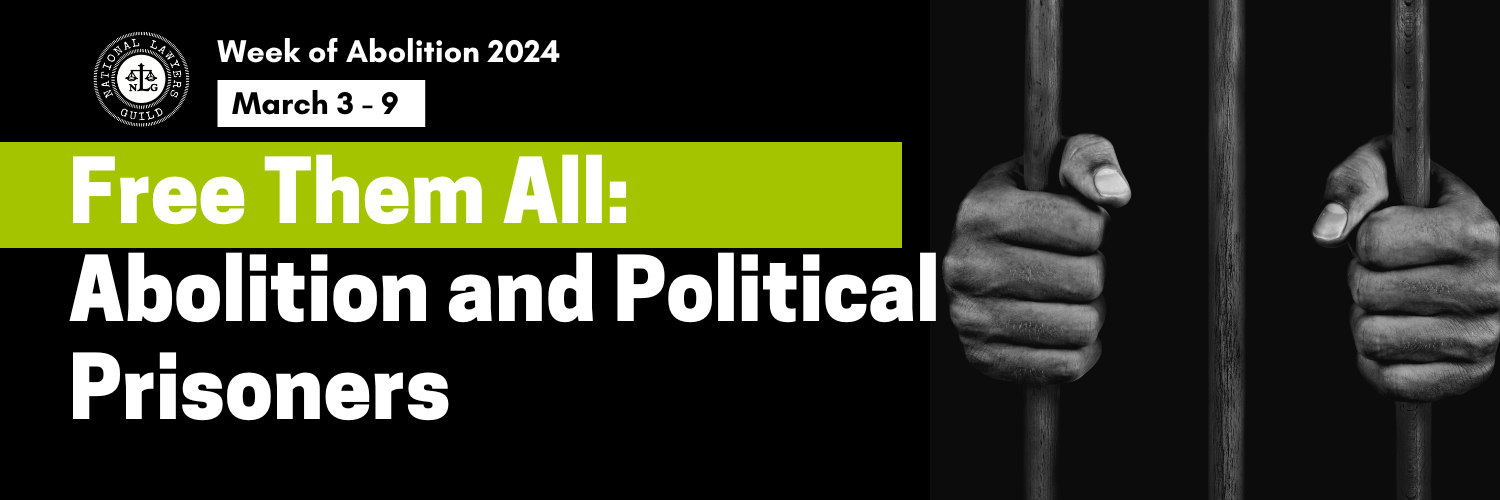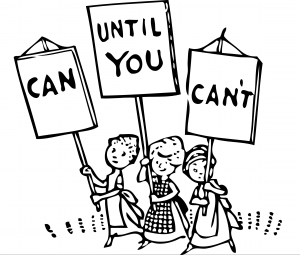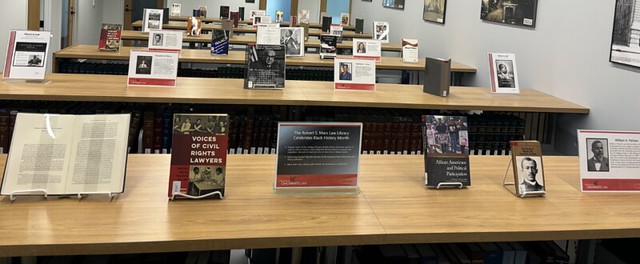This week in the Law Library we’re teaching advanced legal research, advanced searching techniques, and helping students research this semester’s brief topic. We’re also celebrating President’s Day and Black History Month. We’re also previewing US Supreme Court oral arguments.
This Week’s Research Sessions
Monday, Feb. 19, 2024
Advanced Legal Research Criminal Law
Associate Dean Michael Whiteman and Instructional & Reference Services Librarian Ashley Russell
Room 107
2:00pm – 2:55pm
Tuesday, Feb. 20, 2024
Advanced Legal Research Civil Litigation
Associate Director Susan Boland & Instructional & Reference Services Librarian Laura Dixon-Caldwell
Room 135
2:00pm – 2:55pm
Wednesday, Feb. 21, 2024
Advocacy, Lawyering II, Cohort 3
Associate Director Susan Boland
Room 230
10:40am – 12:05pm
Advanced Searching
Advocacy, Lawyering II, Cohort 4
Electronic Resources Instructional Services Librarian Ron Jones
Room 245
10:40am – 12:05pm
Advanced Searching
Advanced Legal Research Ohio
Electronic Resources Instructional Services Librarian Ron Jones
Room 107
2:00pm – 2:55pm
Thursday, Feb. 22, 2024
Advocacy, Lawyering II, Cohort 2
Instructional & Reference Services Librarian Laura Dixon-Caldwell
Room 230
10:40am – 12:05pm
Help with Brief Research
Advocacy, Lawyering II, Cohort 6
Instructional & Reference Services Librarian Laura Dixon-Caldwell
Room 230
3:05pm – 4:30pm
Help with Brief Research
Friday, Feb. 23, 2024
Advocacy, Lawyering II, Cohort 3
Associate Director Susan Boland
Room 230
10:40am – 12:05pm
Help with Brief Research
Happy President’s Day!

President’s Day is celebrated on the third Monday in February. President’s Day started in 1879 when George Washington’s birthday, February 22nd, was designated a legal holiday for the District of Columbia. Chap. 38, 20 Stat. 277 (1879). The Federal holiday is still officially named for George Washington and the name was never changed to President’s Day. It was moved to the third Monday in February after the Uniform Monday Holiday Law. Pub. L. 90–363, 82 Stat. 250 (1971). Interested in researching presidents? Check out some of the resources below:
Public Papers of the Presidents
Compilation of Presidential Documents 1992 – Present
State of the Union Addresses – 1994 – Present
Presidential Proclamations
Presidential Inaugural Addresses
Impeachment Related Publications
Library of Congress Presidents of the United States: Resource Guides
Smithsonian National Museum of American History, The American Presidency: A Glorious Burden
The American Presidency Project
NARA, Presidential Libraries
2024 Robert S. Marx Lecture
The Legal Landscape After Roe’s Reversal
Friday, Feb. 23, 2024
12:15pm – 1:15pm
Room 160
Rachel Rebouché, Dean of Temple University Beasley School of Law and the James E. Beasley Professor of Law, will discuss the topic “The Legal Landscape After Roe’s Reversal”in this year’s Robert S. Marx Lecture. This lecture examines the paradigm shift that is occurring now that the Supreme Court has overturned Roe v. Wade. Returning abortion law to the states will spawn perplexing legal conflicts across state borders and between states and the federal government. This lecture emphasizes how these issues intersect with innovations in the delivery of abortion, which can now occur entirely online and transcend state boundaries. The interjurisdictional abortion wars are coming, and this lecture provides the roadmap for this aspect of the aftermath of Roe’s reversal.
More information and registration
Featured Study Aids
Available through the West Academic study aid subscription, this book tells the story of a dozen notable presidential power disputes in our nation’s history. Ranging from the Neutrality Controversy of 1793 to the Supreme Court’s decision in Hamdan v. Rumsfeld in 2006, the chapters present a diversity of presidential powers issues as well as a dispute’s historical and legal background.
Available via the Aspen Learning Library, this study aid walks the student through issues pertaining to the structure of our constitutional system, including judicial review, justiciability, national power, supremacy, the separation of powers and federalism, as well as some of the structural limitations that the Constitution imposes on state powers. Combines textual material with well-written and comprehensive examples, explanations, and questions to test students; comprehension of the materials and provide practice in applying legal principles to fact patterns. New to the Ninth Edition: Inclusion of more than 40 new Supreme Court cases, more sophisticated discussion of the federal preemption doctrine, updated treatment of presidential impeachment, expanded discussion of the executive privilege doctrine, and deeper coverage of the appointment and removal of federal officials.
Available through the LexisNexis Digital Library study aid subscription, this text addresses the role of administrative agencies in our system of government, the processes of administrative decision making by agencies, and judicial review of agency action. It touches on the substance of the laws that agencies are called upon to implement and administer. As students study the topic of administrative law and later enter into legal practice, they will find that the substance of the laws that agencies implement and administer and the procedures that agencies follow in performing those functions are increasingly intertwined and, in many instances, almost inextricable. An awareness that no bright line exists between substance and procedure, particularly in the context of an administrative agency, is especially helpful to a thorough understanding of administrative law. Additionally, Understanding Administrative Law identifies trends in judicial review of agency action, including an evolving jurisprudence regarding the nondelegation doctrine, agency design, and judicial deference to agency interpretations of law.
Featured Database
Available on HeinOnline, this database contains the Messages and Papers of the Presidents, Daily and Weekly Compilations of Presidential Ddocuments, Public Papers of the Presidents, documents relating to impeachment, Title 3 of the CFR, and other related works.
Featured Guide
Congress creates administrative agencies and delegates to them the authority to act, but they are part of the executive branch. Administrative agencies generate rules and regulations, much like a legislature generates statutes. These administrative rules and regulations help further interpret a statute. Additionally, agencies may conduct hearings and issue decisions concerning matters that fall under their jurisdiction, much like a court. Finally, agencies may also investigate and enforce violations. This guide describes how to research Federal Administrative Law.
Featured Treatise
Available via Oxford Scholarship Online, this book places the law of the executive branch firmly in the context of constitutional language, framers’ intent, and more than two centuries of practice. The book strives to separate legitimate from illegitimate sources of power, through analysis that is informed by litigation as well as shaped by presidential initiatives, statutory policy, judicial interpretations, and public and international pressures. Each provision of the US Constitution is analyzed to reveal its contemporary meaning in concert with the application of presidential power. Controversial issues covered in the book include: unilateral presidential wars; the state secrets privilege; extraordinary rendition; claims of “inherent” presidential powers that may not be checked by other branches; and executive privilege.
Featured Videos
Some newer work on Article II – authored by the scholars proposing this symposium – addresses other core parts of Article II and finds an original design of a constrained Presidency, subordinate in many respects to the Congress. New research on English and colonial institutional design and practice offer insights into Article II. New readings of the Constitution’s Vesting Clause and of the First Congress spark a fresh debate about legislative delegations to the executive branch and the scope of presidential power. New histories of emergencies in American history help us understand the evolution of executive power, especially after the debate about Trump’s border wall spending and during pandemic measures in the Covid-19 era. New interpretations of nineteenth-century administrations help us understand the construction of presidential power – and the emergence of the separation of powers — over time. And new research into the eighteenth century has sparked new legal debates about fiduciary constitutionalism and non-delegation of legislative power. This conference brings together many authors on opposite sides of these debates to discuss, synthesize, dig deeper into the past, and move forward into the future of constitutional interpretation.
Featured Website
February is Black History Month

This year’s theme for Black History Month is “African Americans and the Arts”. According to the Association for the Study of African American Life and History, “African American artists have used art to preserve history and community memory as well as for empowerment.”
White House Proclamation on National Black History Month
5 More Resources to Help You Celebrate and Learn During Black History Month
A person’s civil rights ensure protection from discrimination based on race, gender, sexual orientation, national origin or ethnicity, religion, age, and disability. While often confused, civil liberties, on the other hand, are basic freedoms outlined in the Bill of Rights and Constitution. Examples of civil liberties include the right to free speech, to privacy, to remain silent during police interrogation, and the right to have a fair trial. The lifeblood of civil rights protection in the United States is the equal protection clause of the Fourteenth Amendment (“No state shall make or enforce any law which shall … deny to any person within its jurisdiction the equal protection of the laws”). Click through the pages in this database to learn how far our nation has come in fulfilling its promise of “all men are created equal” and how much further it still can go.
This HeinOnline collection brings together a multitude of essential legal materials on slavery in the United States and the English-speaking world. It includes every statute passed by every colony and state on slavery, every federal statute dealing with slavery, and all reported state and federal cases on slavery.
A comprehensive collection of scholarship focused on the lives and events which have shaped African American and African history and culture, coupled with precise search and browse capabilities. Features over 7,500 articles from Oxford’s reference works, approximately 100 primary sources with specially written commentaries, over 1,000 images, over 100 maps, over 200 charts and tables¸ timelines to guide researchers through the history of African Americans and over 6¸000 biographies. The core content includes: Africana, which presents an account of the African and African American experience in five volumes; the Encyclopedia of African American history; Black women in America 2nd ed; and the African American national biography.
ProQuest’s Black Freedom Struggle in the United States features 2,000 expertly selected primary source documents – historical newspaper articles, pamphlets, diaries, correspondence and more – from pivotal eras in African American history. Documents are focused on six different phases of Black Freedom: 1. Slavery and the Abolitionist Movement (1790-1860) — 2. The Civil War and the Reconstruction Era (1861-1877) — 3. Jim Crow Era from 1878 to the Great Depression (1878-1932) — 4. The New Deal and World War II (1933-1945) — 5. The Civil Rights and Black Power Movements (1946-1975) — 6. The Contemporary Era (1976-2000). The documents presented here represent a selection of primary sources available in several ProQuest databases.
The Black Studies Center consists of scholarly journals, commissioned overview essays by top scholars in Black Studies, historic indexes, and The Chicago Defender newspaper from 1910-1975. At the heart of Black Studies Center is Schomburg Studies on the Black Experience, consisting of essays that provide an introduction to major topics in Black Studies. Explore interdisciplinary topics through in-depth essays; read the seminal research and timelines that accompany each topic; and search for images and film clips to provide another dimension to your research.
University of Cincinnati Events
Law Library Display

Explore some of the College of Law’s notable African American alumni as well as a few of history’s most impactful African American Lawyers and Legislators. Be sure to check out one (or two) of our display books!
Explore these select titles for Black History Month.
Lift Every Voice Sing-A-Long
Every Monday
12:00pm
TUC Atrium
Join the AACRC Choir, The Black Faculty Association, and the Department of Africana Studies in paying homage to James Weldon Johnson’s eloquent poem-turned-hymn that was recognized in 1919 by the NAACP as the “Negro National Anthem” and is today still celebrated as the “Black National Anthem.”
The Unvarnished Truth: Race and Bias in Journalism
Tuesday, February 20, 2024
11:00am-12:20pm
AACRC
Listen in as a panel of local Black journalists discuss the challenges they face in the newsroom and out in the field in regard to racial bias and public discourse. They’ll also talk about the evolving job opportunities for Black journalists, and why diversity in the modern newsroom matters more than ever.
Lead Like a Leader: Black Excellence in Leadership
Wednesday, February 21, 2024
8:00am – 10:00pm
Steger Student Life Center
The Center for Student Involvement celebrates Black History Month by highlighting and celebrating leaders who have celebrated, advocated, and honored the experiences of the Black community. We will be offering information for three weeks (February 7-14, 14-21, and 21-28) about three different leaders, both globally and locally. You can come learn, reflect, and celebrate their contributions and how you can contribute to equality, equity, and unity in our community.
Black-Owned Business Fair
Wednesday, February 21, 2024
11:30am-3:00pm
Lindner College of Business/Atruim
A vibrant showcase featuring 10 outstanding Black-owned busineseses from the city of Cincinnati. This is a fantastic opportunity to support local entrepreneurs, discover unique products and services, and celebrate the contributions of Black-owned businesses to our community.
Drink-N-Think
Wednesday, February 21, 2024
6:30pm
Ludlow Wines
331 Ludlow Ave.
Ludlow Wines will host Dr. Holly Y. McGee every Wednesday in Black History Month for a 4-part lecture series on everything you’ve ever wanted to know about African American History but were hesitant to ask.
The Power of Archival History in the Future of African American Communities
Thursday, February 22, 2024
6:00pm-9:00pm
Probasco Auditorium
Dr. Meredith Evans, Historian and 75th President of Society of American Archivists, will present on how one local, historical Black church is poised to be a national model for preservation success. Dr. Evans will discuss the importance of archival work being conducted by Union Baptist Church, and how technology is playing a key role in linking African American history to the Black Future. Cosponsored by the Union Baptist Church and the Charles P. Taft Research Center.
Common Read: Janelle Monae’s The Memory Librarian (Black Sociology Reading Group)
Friday, February 23, 2024
12:00pm-1:00pm
Harambee Room, AACRC
Pick up a free copy of Janelle Monae’s short story collection, The Memory Librarian, in A&S 248 and then join for a group discussion of the book!
Jazz Concert
Friday, February 23, 2024
5:30pm-7:30pm
Main Lounge, AACRC
“A Jazz Thing” – A Black History Month Jazz Showcase featuring the CCM Jazz Quintet
Union Baptist Church + Union Baptist Cemetery Tour
Sunday, February 25, 2024
10:45am (in-person and social media livestream) and 2:00pm (in-person or via Zoom)
405 West Seventh Street (church) and 4933 Cleves Warsaw Pike (cemetery)
It’s the final Historical Church visit at Union Baptist Church, the oldest, free Black Baptist church in the state of Ohio. Following services, enjoy fellowship and refreshments with congregants before heading to Union Baptist Cemetery to learn about the hidden history of Black Cincinnati, led by cemetery historian, Chris Hanlin.
“Lincoln School Story” Screening and Discussion
Sunday, February 25, 2024
1:00pm-3:00pm
The Esquire Theatre
Screen this new documentary film which tells the inspiring story of a group of courageous African American mothers and children and their fight for school integration in 1954 in the town of Hillsboro, Ohio. Their lawsuit against the school board was one of the first test cases of the historic Brown v. Board of Education decision. Despite segregationist redistricting, cross burnings, job losses and legal threats, they marched for two years in one of the longest sustained civil rights marches in American history.
February Arguments at the United States Supreme Court

From SCOTUS Blog:
Tuesday, February 20, 2024
Corner Post v. Bd. of Governors of the Fed. Reserve Sys. – whether a plaintiff’s Administrative Procedure Act claim “first accrues” under 28 U.S.C. § 2401(a) when an agency issues a rule — regardless of whether that rule injures the plaintiff on that date — or when the rule first causes a plaintiff to “suffer[] legal wrong” or be “adversely affected or aggrieved.”
Bissonnette v. LePage Bakeries Park St., LLC – whether, to be exempt from the Federal Arbitration Act, a class of workers that is actively engaged in interstate transportation must also be employed by a company in the transportation industry.
Wednesday, February 21, 2024
Ohio v. Env’t Prot. Agency – (1) whether the court should stay the Environmental Protection Agency’s federal emission reductions rule, the Good Neighbor Plan; and (2) whether the emissions controls imposed by the rule are reasonable regardless of the number of states subject to the rule.
Warner Chappell Music v. Nealy – whether, under the discovery accrual rule applied by the circuit courts and the Copyright Act’s statute of limitations for civil actions, 17 U.S.C. § 507(b), a copyright plaintiff can recover damages for acts that allegedly occurred more than three years before the filing of a lawsuit.









